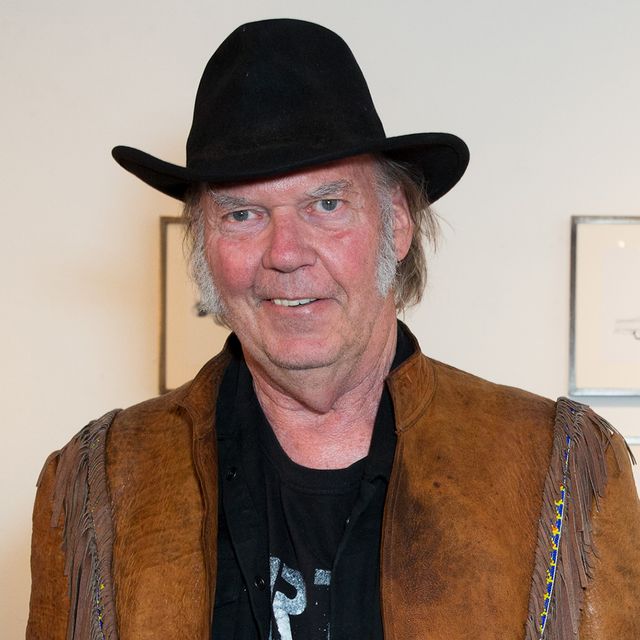BREAKING: Neil Young Pulls All Music from Amazon over Jeff Bezos’ Support for Trump Administration
On October 8, 2025, legendary folk-rock musician Neil Young announced he would be pulling his entire music catalog from Amazon, citing concerns over Jeff Bezos’ support for the Trump Administration. In a statement on the Neil Young Archives website, he urged fans to boycott Amazon, Whole Foods, and Facebook, encouraging them instead to support local businesses as a way to “take back America from big corporations.”
The Reason Behind the Decision

Neil Young criticized Amazon and its subsidiaries, such as Whole Foods, for what he called “selling out America” and failing to serve the interests of ordinary people. He wrote, “Bezos supports this administration. It does not support you or me.” Young also highlighted the adverse effects of government shutdowns on Americans’ incomes, safety, and healthcare, framing his decision as part of a broader protest against corporate influence over politics.
In his statement, Young emphasized that his music is a platform for social responsibility. He urged fans to reflect on the implications of supporting companies whose leadership aligns with policies or political figures that, in his view, threaten the welfare of everyday citizens.
A History of Musical Boycotts
This is not the first time Neil Young has taken dramatic action against major corporations over ethical concerns. In 2022, he temporarily removed his music from Spotify to protest the platform’s spread of misinformation about COVID-19, particularly through Joe Rogan’s podcast. While he later returned his music to Spotify in 2024, the episode underscored Young’s long-standing commitment to ethical principles in the music industry.
His history of activism, both through his music and public statements, demonstrates a pattern: Young has repeatedly used his platform to challenge corporate behavior and advocate for social accountability. This latest move against Amazon fits into a broader narrative of artists holding powerful companies accountable for political and social influence.
Public Reaction

The announcement sparked a flurry of reactions across social media platforms. Critics dismissed Young as “out of touch” or accused him of seeking attention through controversy. Memes and viral posts poked fun at the legendary musician, questioning whether his stance would have any real-world impact.
Conversely, a substantial portion of his fanbase praised the move as courageous. Supporters argue that Young is setting a precedent for artists who are unwilling to separate their work from ethical and political considerations. Many pointed to the symbolic power of a music icon taking a stand against one of the world’s largest corporations, framing it as an example of activism in the entertainment industry.
Potential Impact on Amazon
It remains unclear whether Young’s withdrawal will primarily affect Amazon Music’s streaming service or also encompass physical music sales through Amazon’s e-commerce platform. Amazon has not yet issued an official response regarding the decision. However, the public nature of Young’s protest could influence the company’s image among consumers and other artists who may be contemplating similar actions.
Analysts suggest that while the immediate financial impact on Amazon may be minimal, the reputational ramifications could resonate more widely. The move draws attention to the intersection of politics, corporate responsibility, and entertainment—a topic that increasingly shapes public perception of major companies.
Broader Implications

Neil Young’s decision highlights an ongoing trend of artists leveraging their platforms to influence social and political issues. In an era where corporate involvement in politics is scrutinized more than ever, such gestures can resonate with fans and the general public alike. It also raises questions about the role of music and art in activism: Can a single artist’s actions encourage a broader movement for corporate accountability? Or will it remain a symbolic gesture with limited tangible effect?
For Young, the choice is clear. Music is not just entertainment; it is a tool for advocacy. By removing his catalog from Amazon, he sends a message that ethics and personal conviction outweigh profit and convenience. This aligns with a career-long pattern of taking principled stances, whether it be environmental advocacy, social justice, or challenging misinformation.
Conclusion
Neil Young’s announcement to withdraw his music from Amazon over Jeff Bezos’ political affiliations is both a protest and a call to action. While it has sparked debate and divided opinions, it reaffirms Young’s commitment to using his influence responsibly. Whether or not it will lead to broader corporate change remains to be seen, but it undeniably places ethical considerations at the forefront of the conversation about music, business, and politics.
In an age of increasing corporate power, Young’s move serves as a reminder that artists can, and often do, play a role in shaping public discourse beyond their art. For his fans, it’s a powerful example of integrity; for the industry, a challenge to consider the broader consequences of alignment with controversial political figures.